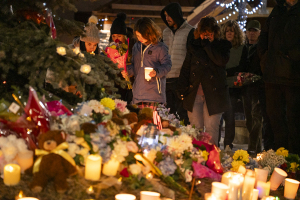What I learned serving 15 years in prison as a father
As a young father, I didn’t realize that a single decision would cost me moments that I would spend a lifetime trying to get back.
I ended up serving 15 years of a 25-year sentence for my wrong choice. Being behind bars was painful for many reasons, but nothing compared to the regret of being separated from my children — a misery made worse around Father’s Day.
While I was locked up, I missed my oldest daughter’s first day of school. I missed my son being born. I wasn’t there to hold my youngest daughter when she suffered severe burns or was bullied. I missed so many things that mattered.
During my incarceration, I was determined to become the man and father my family need. And I did, thanks in large part to the Prison Fellowship Academy® at the Carol S. Vance Unit near Houston, where I learned about parenting, how to be a man, and how to work through relational issues. Access to programs like these is critical for those who want to change.
I can’t get back the moments I missed, but today, by the grace of God, I’ve been released, and I still have relationships with my children. I have a stable job, a loving wife, and a positive outlook. Incarceration will always be part of my story, but together we are moving into a new future.

But many families are still in the situation we faced. Nearly 1 in 28 American children —most of them under the age of 10 — have a parent in prison right now. These kids feel the impact of the criminal justice system in countless ways, big and small: fewer financial resources for food and other needs, change in living circumstances, social pressure and stigma, time away from a parent, and more.
Even after a parent is released, the effects of the criminal justice system linger. When I was released the day before Thanksgiving in 2017, I was ready to make the most of that second chance. But parole felt like a false start.
For the first few months, I was required to wear a monitor around my ankle. I couldn’t go far from my home, and I couldn’t be out for long. At first, I couldn’t even move into my new home with my wife and daughter. I couldn’t go out and search for a job, so I was told to look online. Fortunately, I was tech-savvy enough to do that. But what if —like many of the people behind bars — I didn’t have those skills?
Because of other parole restrictions, I couldn’t earn much-needed overtime pay unless it was scheduled weeks in advance. I couldn’t travel to certain events and activities my kids were participating in because of restrictions on my movement, making it difficult to nurture those relationships.
My experience as a black man on parole was not unusual when compared to the 1 in 23 African Americans — or the 1 in 55 American adults — on probation or parole. Parole is a necessary part of the justice system, but people should be supervised appropriately, allowing them to transition back into life on the outside. Undue restrictions that prevent parents from attending graduations, recitals, or athletic events end up hurting the children far more than the adults. And, as states deal with COVID-19, they ought to consider less frequent check-ins and focus on making those check-ins virtual. Parole conditions should be personally tailored and should reflect the current hardships of the pandemic, including the embattled economy and high unemployment. Such realities may hinder an individual’s ability to get a job and, therefore, ability to pay fines more now than ever before.
Hundreds of thousands of dads will spend this Father’s Day behind bars, separated from their children by concrete, razor wires, and their own bad choices. But they aren’t incapable of change. They may be out of sight and out of mind — but they’re never out of hope.
My prayer is that every parent affected by incarceration would have access to support systems, in-prison programs, and common-sense parole requirements to help them overcome the roots of their criminal lifestyles, become better parents, and be reconciled to their families and communities.
It’s not just fathers behind bars who will benefit from that second chance — our children will, too.
Jonathan Smith is a father of three and a returning citizen. He graduated from programming provided by Prison Fellowship, the nation’s largest Christian nonprofit serving prisoners, former prisoners, and their families.



























